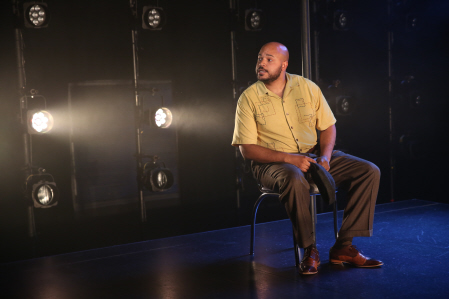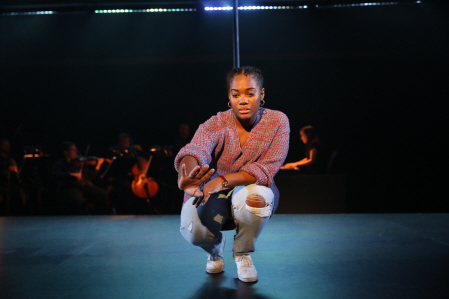Review: Beautifully Realized Chamber Musical BROADBEND, ARKANSAS Examines A Family's Legacy From The 60s Civil Rights Movement
|
There is a firm, but understated strength that permeates the atmosphere during Broadbend, Arkansas, the beautifully realized two-person chamber musical created by composer Ted Shen and librettists Ellen Fitzhugh and Harrison David Rivers, depicting an event during the 1960s Civil Rights Movement in one act and its legacy in the next.

It can be felt through Michael Starobin elegantly minimalist orchestrations performed in view of the audience by conductor/pianist Deborah Abramson and a small string and reed ensemble. And, as directed by Transport Group's artistic director, Jack Cummings III in a production presented in association with The Public Theater, it can be felt in the graceful intertwining of spoken words and sung words sensitively acted by Justin Cunningham and Danyel Fulton, as each performs a one-act solo musical monologue.
The first piece, "Just One Q" (libretto by Fitzhugh) refers to the existence of just one Q tile in a Scrabble set, the letter standing for who gets to be queen of the nursing home where African-American orderly Benny (Cunningham) patiently endures the animosity between two white women. Julynne, who runs the home, and resident Bertha were at different times were married to the same man and each believes they have the right to be buried beside him.
With his wife institutionalized, Benny tries his best to be a good father to his twin daughters, but it's 1961, and when Bertha is deemed to live with her daughter in Memphis, he volunteers to have his girls stay with Julynne so he can drive her over, knowing that the trip crosses the route of the Freedom Riders; busloads of civil rights activists who broken segregation laws in southern bus terminals.
The events that follow pit Benny's desire to join this group actively fighting for his people's rights against his responsibility to stay out of danger for the sake of his children.

The second act, titled "Ruby" (libretto by Rivers with additional lyrics by Shen), takes place thirty years later. Benny has passed on and one of his daughters (Fulton) has learned that her 15-year-old son has been hospitalized after an encounter with police. There is no linear plot here. It's more of an exploration of the trauma that is festered by generational abuse, as Ruby relates her son's situation with the circumstances surrounding her father's death.
Played primarily in dark surrounding (the lighting is by Jen Schriever) on a platform containing minimal set pieces (Dane Laffrey is credited as set consultant) BROADBEND, ARKANSAS coveys a feeling of isolation as its two characters regard their personal everyday struggles against the headline-making instances of abuse and inequality.
Videos

